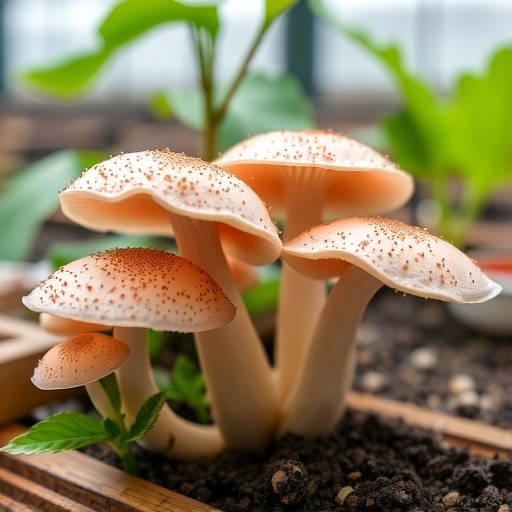In the rapidly evolving field of agricultural science, the search for sustainable pest management solutions has reached a critical point. Recent pioneering research conducted by Mitu, Aminuzzaman, and Kibria delves into the application of the fungal organism Paecilomyces lilacinus as a biological control agent against the notorious plant parasitic nematode, Meloidogyne incognita. This study, published in the journal Discover Agriculture, opens new doors not only for pest management but also for enhancing vegetable growth, a crucial factor in food security.
The nematode Meloidogyne incognita, commonly known as root-knot nematode, is one of the most significant threats to vegetable crops worldwide. It causes substantial economic losses, leading to reduced yield quality and quantity. Traditional methods of managing this pest, primarily relying on chemical nematicides, have raised concerns among consumers and environmentalists alike due to their toxicity and long-term environmental impact. Thus, the exploration of alternative, eco-friendly strategies for nematode management has become imperative.
Paecilomyces lilacinus is a filamentous fungus known for its entomopathogenic properties and ability to parasitize various nematode species. This research provides an in-depth insight into its potential as a biocontrol agent against Meloidogyne incognita. The authors conducted a series of controlled experiments to evaluate the effectiveness of P. lilacinus in suppressing nematode populations while simultaneously promoting the growth of selected vegetable crops. Their findings reveal a remarkable capacity of this fungus to reduce nematode infestations significantly.
In their experiments, the researchers implemented a dual approach. They inoculated soil samples infested with Meloidogyne incognita with varying concentrations of Paecilomyces lilacinus. Over a designated period, they monitored the nematode population dynamics and assessed vegetable growth metrics such as height, biomass, and root development. The results were compelling; P. lilacinus not only suppressed nematode populations but also enhanced overall plant vigor.
The mechanism through which P. lilacinus operates is multifaceted. The fungus competes with nematodes for resources in the soil, effectively diminishing their ability to thrive. It also produces metabolites that are toxic to the nematodes, further contributing to their decline. The research highlights the importance of understanding such biological interactions since employing natural enemies like P. lilacinus could be a cornerstone in integrated pest management programs aimed at sustainable agriculture.
Moreover, the study underscores the potential of using biocontrol agents like P. lilacinus within the context of organic farming practices. As consumers increasingly demand organic produce, the necessity for effective pest control methods that do not compromise the integrity of organic-certified crops has grown. The successful implementation of P. lilacinus in vegetable production could potentially fulfill these market demands while simultaneously addressing pest problems.
In addition to its nematicidal properties, the application of Paecilomyces lilacinus showed a marked improvement in the biochemical parameters of the plants. Enhanced chlorophyll content, increased root length, and elevated biomass were observed in the treated vegetable samples. This observation is critical as it points to the dual benefits of utilizing biological control agents—not only do they manage pest populations effectively, but they also stimulate healthy plant growth.
Furthermore, this research paves the way for future investigations into the utilization of Paecilomyces lilacinus in various agricultural systems. The climatic adaptability and ecological resilience of this fungus make it an appealing candidate for widespread application. Studies can explore its effects under diverse environmental conditions, including variations in soil types and moisture levels, which could lead to optimized methodologies for different regions.
But challenges remain. The integration of biocontrol agents into conventional farming practices necessitates a shift in farmer education and willingness to adopt innovative solutions. While the advantages of biological control are becoming increasingly recognized, bridging the gap between research findings and practical application in the field still poses a significant hurdle. Comprehensive outreach and demonstration projects that showcase the efficacy of P. lilacinus could be instrumental in changing perceptions toward biological control methods.
As we move towards a more sustainable agricultural landscape, research such as that conducted by Mitu and colleagues is invaluable. Their findings highlight the potential for Paecilomyces lilacinus not only to combat nematodes but also to contribute positively to crop growth and yield. Given the critical importance of food production and security in a world facing climatic and ecological challenges, innovative and eco-friendly solutions must be prioritized.
In conclusion, the application of Paecilomyces lilacinus represents a promising avenue for integrated pest management, showcasing how natural solutions can complement conventional practices to foster healthier crops and sustainable farming. The implications of this research extend beyond mere pest control; they resonate with the broader goals of agricultural sustainability and ecological conservation.
The future of agriculture might very well hinge on studies like these, which fuse science and practicality into accessible methods for real-world challenges. As farmers, researchers, and policymakers tune into the benefits provided by P. lilacinus, the pathway will be clearer toward a more resilient agricultural sector, capable of meeting the demands of a growing population while safeguarding our planet.
Subject of Research: Application of Paecilomyces lilacinus in nematode management and vegetable growth enhancement
Article Title: Application of Paecilomyces lilacinus to suppress the Meloidogyne incognita and promote the growth of some selected vegetables
Article References:
Mitu, A.I., Aminuzzaman, F.M., Kibria, T. et al. Application of Paecilomyces lilacinus to suppress the Meloidogyne incognita and promote the growth of some selected vegetables. Discov Agric 3, 149 (2025). https://doi.org/10.1007/s44279-025-00210-x
Image Credits: AI Generated
DOI: 10.1007/s44279-025-00210-x
Keywords: Biocontrol, nematodes, Paecilomyces lilacinus, Meloidogyne incognita, sustainable agriculture, vegetable growth, environmental impact.




